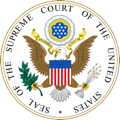US Supreme Court asked to review software patents ruling
 The Electronic Frontier Foundation (EFF) civil rights organisation, the Computer and Communications Industry Association (CCIA), and open source company Red Hat have urged the US Supreme Court to provide further guidelines on the patentability of software and computer-based inventions. They have asked the Supreme Court to clarify the point at which an idea becomes too abstract to be patented, saying that current legislation in this area is inconsistent, confusing and impedes progress in the internet and computer fields.
The Electronic Frontier Foundation (EFF) civil rights organisation, the Computer and Communications Industry Association (CCIA), and open source company Red Hat have urged the US Supreme Court to provide further guidelines on the patentability of software and computer-based inventions. They have asked the Supreme Court to clarify the point at which an idea becomes too abstract to be patented, saying that current legislation in this area is inconsistent, confusing and impedes progress in the internet and computer fields.
The current case revolves around Ultramercial suing the Hulu video site and the WildTangent games provider. The Californian company specialises in online advertising and has accused both internet platforms of violating its US patent number 7,346,545.
The patent protects a method for displaying ads before copyrighted online content is displayed. In the dispute, the Court of Appeals for the Federal Circuit in Washington, which is in charge of the matter, has refused to rehear the case. According to the EFF, the Federal Circuit Court admitted that "the mere idea that advertising can be used as a form of currency is abstract", yet found that when that idea would "likely" require "intricate and complex computer programming", it was no longer abstract.
The EFF is concerned that the ruling could make it possible to obtain patents for otherwise unpatentable abstract ideas by using internet-based methods. The organisation said that "the courts ... have continued to confuse the standard for what is patentable in the wake of Bilski" – the Supreme Court's ruling on software patents and on the protection of business practices in the dispute about a claim by programmer Bernard Bilski. In 2010, the US Supreme Court ruled that the "machine-or-transformation test" used by the Federal Circuit judges could not be used as the sole test of the patent eligibility of a "process-based innovation".
After the decision, the Court of Appeals further restricted software patents in two cases. In other cases, however, the court has tended to regard relatively abstract processes as patent-eligible. The EFF said that, consequently, neither legal experts nor the general public can currently understand when computer-based inventions are patentable and when they aren't. The EFF added that this creates a lot of legal uncertainty for both patent holders and the programmers and IT system designers who may receive legal threats related to those patents.
(Stefan Krempl / fab)
![Kernel Log: Coming in 3.10 (Part 3) [--] Infrastructure](/imgs/43/1/0/4/2/6/7/2/comingin310_4_kicker-4977194bfb0de0d7.png)

![Kernel Log: Coming in 3.10 (Part 3) [--] Infrastructure](/imgs/43/1/0/4/2/3/2/3/comingin310_3_kicker-151cd7b9e9660f05.png)
















